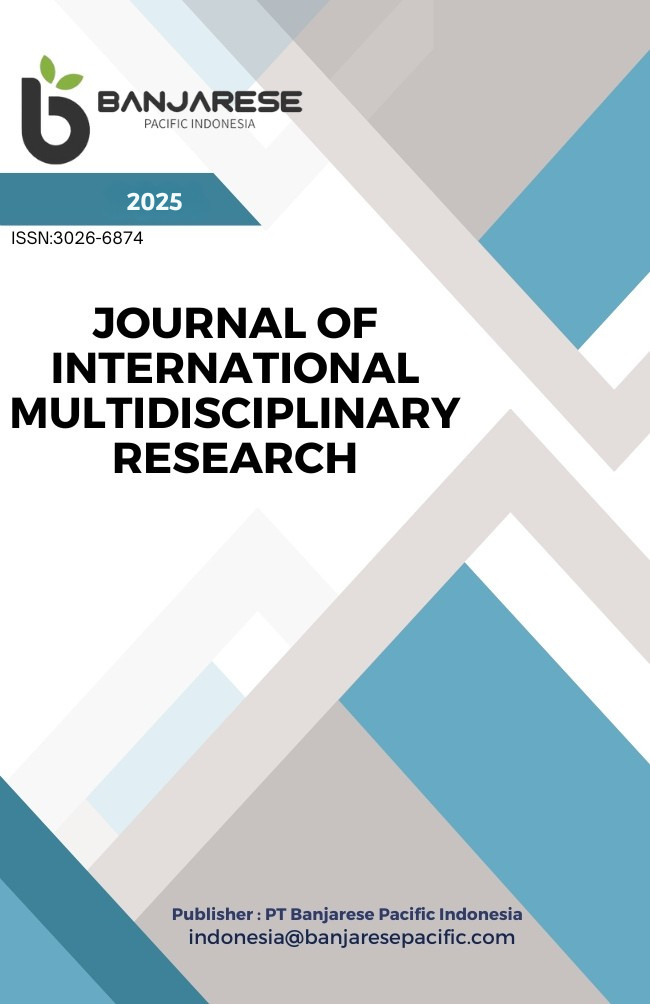Exoneration Clause in Freight Forwarding Agreements from the Perspective of Consumer Protection
DOI:
https://doi.org/10.62504/jimr1400Keywords:
Exoneration clause, Consumer protection, Freight forwarding, UUPKAbstract
Freight forwarding agreements in Indonesia frequently contain exoneration clauses that exempt logistics providers from liability for loss or damage, raising serious concerns regarding consumer protection. While such clauses are designed to manage contractual risk, they often conflict with the principles enshrined in Law No. 8 of 1999 on Consumer Protection (UUPK), particularly those ensuring fairness, good faith, and legal accountability. This study investigates the legality and ethical implications of exoneration clauses within standard-form freight forwarding contracts used by companies such as JNE, TIKI, and SiCepat. Employing a doctrinal legal research methodology, the study integrates statutory, conceptual, and case-based approaches to analyze primary legislation, judicial decisions, and relevant legal doctrines. It critically evaluates the use of these clauses in light of consumer rights, contract theory, and the economic impact on service quality. Findings reveal that exoneration clauses not only contravene the UUPK but also create systemic contractual imbalances due to the lack of negotiation opportunities and transparency. The study proposes a normative legal framework for reform, including clause classification, interactive consent mechanisms, and regulatory enforcement to ensure contractual fairness. This research contributes to both legal scholarship and policy development by highlighting the urgent need for doctrinal clarity and regulatory oversight in Indonesia's logistics sector.
Downloads
References
Arofah, S. N., Sabila, F., Luthfiyah, A., Solichin, S., & Andri, G. Y. (2024). Ambiguous Genitalia Causing Principle of Utmost Good Faith in Insurance Agreements’ Violation. Indonesian Journal of Multidisciplinary Science, 3(8). https://doi.org/10.55324/ijoms.v3i8.881
Bernardus, D., Arisa, F., Sufa, S. A., & Oka, D. (2024). Supporting Start-ups in Indonesia : Examining Government Policies , Incubator Business , and Sustainable Structure for Entrepreneurial Ecosystems and Capital. 5(1), 236–259.
Bulat, I., & Pichko, R. (2020). Civil Legal Aspects of the Recodification of Intellectual Property Rights. E3s Web of Conferences, 168, 23. https://doi.org/10.1051/e3sconf/202016800023
Christie, D. S., Saintier, S., & Viven-Wilksch, J. (2022). Industry-Led Standards, Relational Contracts and Good Faith: Are the UK and Australia Setting the Pace in (Construction) Contract Law? Liverpool Law Review, 43(2), 287–310. https://doi.org/10.1007/s10991-022-09307-5
Dewi, R. S., Surjanti, S., Widowati, W., S, B. S. E., & Pangestuti, E. (2022). The Role of Mediators in ASEAN Trade Disputes in Consumer Protection Law Perspective. Proceedings of the International Seminar on Business Education and Science, 1, 241–251. https://doi.org/10.29407/int.v1i1.2648
Hapsari, D. R. I., & Kurniawan, K. D. (2020). Consumer Protection in the Banking Credit Agreement in Accordance With the Principle of Proportionality Under Indonesian Laws. Fiat Justisia Jurnal Ilmu Hukum, 14(4), 337–352. https://doi.org/10.25041/fiatjustisia.v14no4.1884
Hutchinson, T., & Duncan, N. (2012). Defining and Describing What We Do: Doctrinal Legal Research. Deakin Law Review, 17(1), 83. https://doi.org/10.21153/dlr2012vol17no1art70
Iefimova, G., Марущак, С., & Pashchenko, O. V. (2021). Planning the Maritime Company’s Development on the Basis of Its Economic Security Level. Economic Innovations, 23(2(79)), 76–86. https://doi.org/10.31520/ei.2021.23.2(79).76-86
Irawati, J., & Hutagalung, K. G. K. (2023). Standard Clauses in Vehicle Purchase Credit Agreements in Indonesia: An Examination of Consumer Protection and Legal Enforcement. Journal of Judicial Review, 25(2), 255. https://doi.org/10.37253/jjr.v25i2.8589
Kapoor, R., & Shyamsundar, P. (2023). Informalization of the Formal Sector: Evidence From India’s Manufacturing Industries. Iza Journal of Development and Migration, 14(1). https://doi.org/10.2478/izajodm-2023-0005
Kovalenko, H. (2023). The Significance of Legal Pragmatism and Economic Analysis of the Law for the Theory of Adjudication in the Conditions of Social Life. The Bulletin of Yaroslav Mudryi National Law University Series Philosophy Philosophies of Law Political Science Sociology, 1(56). https://doi.org/10.21564/2663-5704.56.274317
Kristiyani, C. T. S. (2020). Consumer Legal Efforts Due to Abuse of Circumstances (Misbruik Van Omstandigheden) in Standardized Agreements. Notariil Jurnal Kenotariatan, 5(1), 1–7. https://doi.org/10.22225/jn.v5i1.1729
Majeed, N., Hilal, A., & Khan, A. N. (2012). Doctrinal Research in Law: Meaning, Scope and Methodology. 12(4), 135–142.
Presiden Republik Indonesia. (1999). Undang-Undang Republik Indonesia Nomor 8 Tahun 1999 Tentang Perlindungan Konsumen. Peraturan Pemerintah Republik Indonesia, 2003(1), 1–46.
Purnomo, H., M. Arfani, Shadiq, T. F., Brumadyadisty, G., & Asnawi, A. (2024). Adapting And Resilient: How Indonesian Consumers Navigate E-Commerce Restrictions In The Post-Pandemic Retail Industry. Journal of International Multidisciplinary Research, 2(7), 253–272. https://doi.org/10.62504/jimr739
Rahmah, M., Simanjuntak, M., Sari, A. M., & Johan, I. R. (2023). The Study of Program and Roles of National Consumer Protection Agency Using Qualitative and Quantitative Approaches. Journal of Child Family and Consumer Studies, 2(3), 209–222. https://doi.org/10.29244/jcfcs.2.3.209-222
Sari, V. K., & Prastyani, D. (2021). The Impact of the Institution on Economic Growth: An Evidence From ASEAN. Jurnal Ekonomi Pembangunan, 19(1), 17–26. https://doi.org/10.29259/jep.v19i1.12793
Serohin, V., Serohina, S., Гришко, Л., & Danicheva, K. (2021). Recognizing and Implementing International Human Rights Standards in Domestic Legislation: An Exposure Under Ukrainian Law. Ius Humani Law Journal, 10(2), 161–176. https://doi.org/10.31207/ih.v10i2.291
Syafrida, S., & Hartati, R. (2021). Legal Protection of Consumer Rights Based on Article 18 Consumer Law Protection and the Implementation of Balance and Proportionality Principles in Raw Clausula. JHR (Jurnal Hukum Replik), 9(1), 26. https://doi.org/10.31000/jhr.v9i1.4261
Syam, M., Ismansyah, I., Azheri, B., & Hasbi, M. Z. N. (2021). Consumer Protection Enforcement Law Characteristics on Civil Law Aspects in Indonesia. Linguistics and Culture Review, 5(S2), 1471–1481. https://doi.org/10.21744/lingcure.v5ns2.1976
Taklima, M., Sulistiyono, A., & Syamsudin, M. (2023). Consumer Protection as an Instrument for Fulfilling Human Rights in the Economic Sector and Its Constitutionalizing Efforts in the 1945 Constitution. Jurisdictie Jurnal Hukum Dan Syariah, 14(1), 75–105. https://doi.org/10.18860/j.v14i1.20844
Wiener, N. (2020). Labor Market Segmentation and Immigrant Competition: A Quantal Response Statistical Equilibrium Analysis. Entropy, 22(7), 742. https://doi.org/10.3390/e22070742
Wijaya, R., Sarmini, S., Jatiningsih, O., Setyowati, Rr. N., Listyaningsih, & Huda, M. (2023). Exoneration Clause as Limitation of Criminal Liability in Digital Business in Indonesia. Technium Social Sciences Journal, 50, 116–121. https://doi.org/10.47577/tssj.v50i1.9877
Downloads
Published
Issue
Section
License
Copyright (c) 2025 Indah Nuraini, Nur Handayati, Wahyu Prawesti, Hartoyo Hartoyo, Noenik Soekorini (Author)

This work is licensed under a Creative Commons Attribution-ShareAlike 4.0 International License.













